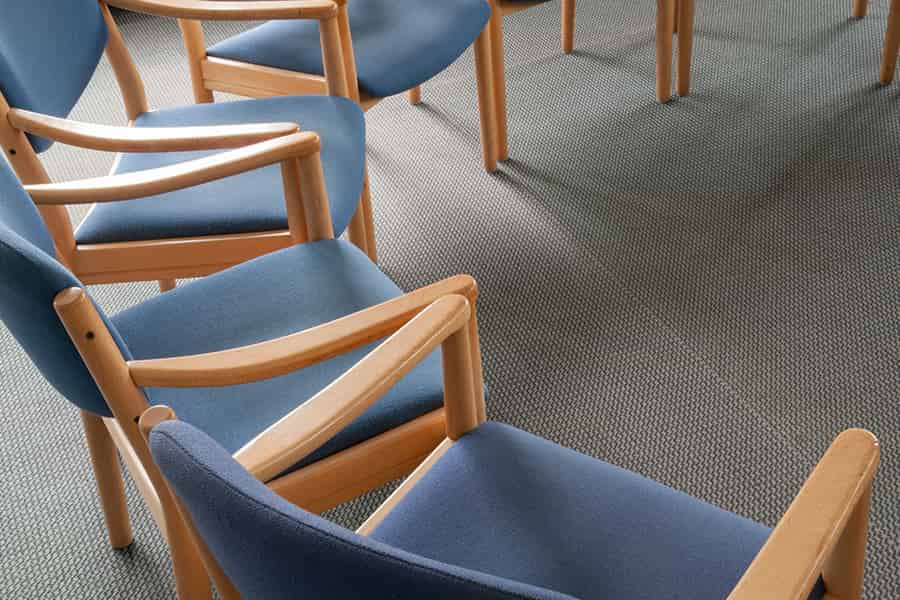It can be easy to get into the habit of pushing aside concerns and replacing problem-solving behaviors with substance use or other non-constructive methods of coping.
We all get used to behaving in certain ways in response to stress; in fact, after reacting to a situation the same way a few times, our brains program the reaction as an auto-response. When this auto-response is self-destructive, such as using drugs and/or alcohol, our problems can actually begin to amplify and lead to uncontrollable drug use. At this point, a professional may need to step in to help reprogram the brain, disrupt the auto-response function, and teach new behaviors.
What is HALT?
One of the most important methods for handling stress, originally developed by Alcoholics Anonymous and still used by therapists today, is HALT-ing.
When a person HALTs, they stop and thoughtfully assess their basic needs: hunger, anger, loneliness, or tiredness.
After approaching their needs and desires mindfully, the person can work on resolving their issues in an appropriate manner. Hunger, anger, loneliness, and tiredness are common craving triggers, so remedying these issues often resolves drug cravings as well.
Hunger
When you feel hungry, your body needs nutrition (proteins, carbohydrates, fat), so it sends a signal to your brain that makes you feel stress in order to motivate you to seek food. This basic biological mechanism ultimately serves the purpose of helping you to live and propagate.
People who are drug-dependent often try to satisfy this stress signal with drugs, maybe because they are unaware that food will relieve this feeling, or maybe because drugs are easier to get. Regardless, eating is the best action when faced with hunger-based stress.
Anger
When you think of being angry, you might think of yelling and screaming obscenities or fighting, then maybe going to grab a drink at a bar. Drinking when angry can lead to overdrinking to the point of slurred speech and an inability to walk. This is not a productive way of handling emotion. Anger can be worked through in a non-self-destructive manner…one that can change personal relationships for the better.
One productive way of handling anger is to discuss the situation with a close friend, a therapist, or multiple people in a group therapy setting. It may also be constructive to engage in physically challenging activities, such as kicking and punching a punching bag, running, biking, etc. However, these actions cannot replace discussing your problems with advocates.
Anger is often fueled by feelings of helplessness and an inability to resolve problems. Expressing your problem and feelings in words helps get the issue off your chest and resolves some of that distress. When you talk with an advocate who works with you through your feelings of anger, you feel relief because you are not alone in your feelings. Your friends and therapist can also give you different perspectives on how to resolve the problem you’re facing in constructive ways.
After thoughtful discussion, inward reflection, and decision-making, you can react appropriately to the person/issue that made you angry. Even if the way you addressed the problem didn’t work, you can still feel happy with yourself and your intentionally thoughtful way of reacting.
Loneliness
One of the most self-destructive responses to distress is hiding yourself and your emotions from others. This reaction might become an auto-response to stress because certain aspects of it are comforting; you don’t have to worry that your feelings lack merit, or whether or not others will support you. However, this reaction also serves to compound the original feelings of distress by making you feel absolutely alone.
It might be somewhat comforting to know that the loneliness is in your imagination and that you can talk about the things that upset you with others. This feeling can be addressed by talking to people you can confide in. Group therapy during drug addiction treatment is an especially good platform for addressing feelings of loneliness when you are trying to learn how to live without drug dependency. The supportive environment of group therapy helps you to not feel so alone.
Tiredness
Frequent drinking or drug use leads to problems with sleep, and operating on a lack of sleep can lead to errors in judgment, poor decision-making, and increased stress, says Arianna Huffington, author of The Sleep Revolution. She says that getting a good night’s rest is required to lead a productive, happy, fulfilling life. One might also feel like they don’t have time to sleep, but sleeping is essential to increasing productivity.
Drug Addiction Therapy
Drug addiction therapists often inquire about your HALT status: have you been sleeping and eating well? Recognizing the things that are causing stress is the first step. The next step is fulfilling your basic needs: eating, expressing your feelings, and sleeping. It is difficult to reprogram your mind and body and develop new ways of responding to stress, but with repetition, support, and encouragement during drug addiction therapy, it can be done.
Sources:
http://treatmentandrecoverysystems.com/library/articles/halt-ing-relapse-before-it-starts/
http://www.chinnstreetcounseling.com/zomerland/zomerland_11.shtml
http://bradfordhealth.com/halt-hunger-anger-loneliness-tiredness/

